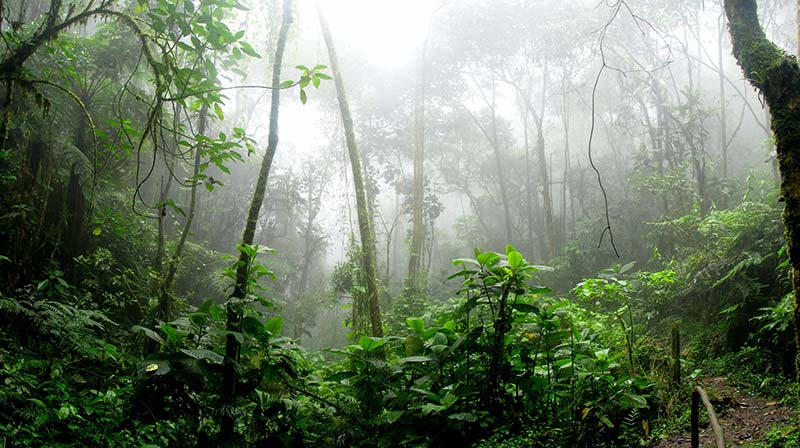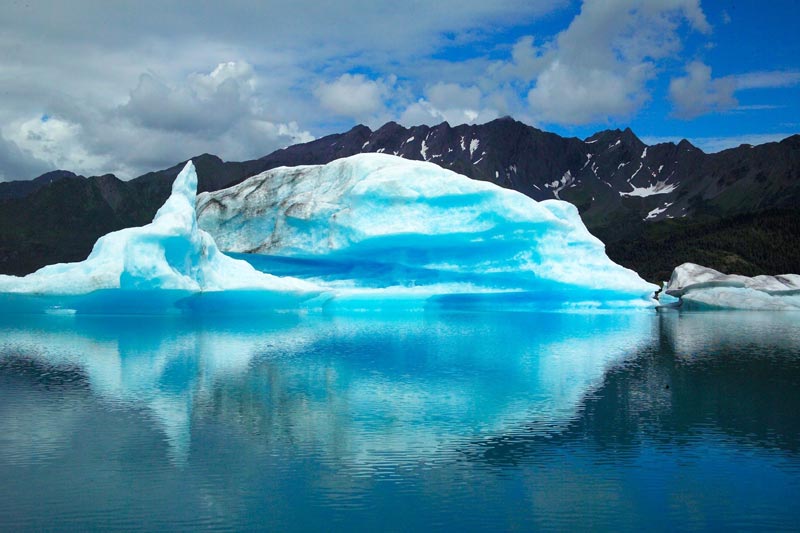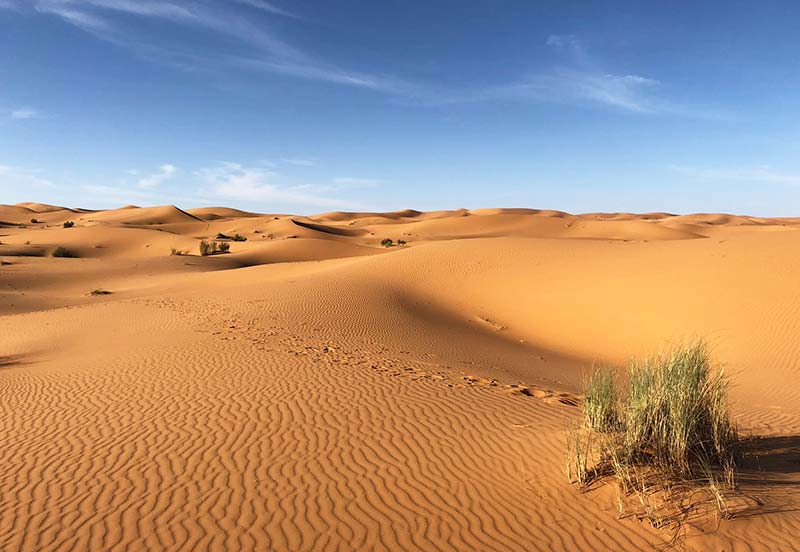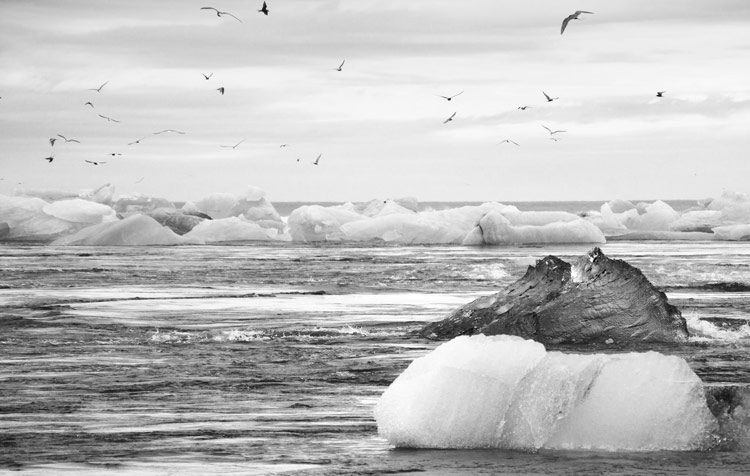Have you ever heard of the Climate tilting elements heard? The Climate Change is a global problem and has finally become a much-discussed topic in the media and in our everyday conversations. But because it is progressing insidiously, it is difficult to grasp. By Extreme weather such as droughts and floods, the spread of diseases or crop failures that threaten our existence, we are already feeling the effects of global warming today. How urgently we actually need a solution to the biggest environmental problem of our time is further underpinned by reaching and exceeding certain climate tipping points.
In this article, I want to introduce you to these tipping points in our climate system so that you can become even more aware of the magnitude of global warming.
Here's another quick table of contents for you:
What is a climate tipping point?
In the dictionary, toggle elements are often referred to as "supraregional component of the global climate system" are described. This refers to important elements of Earth system research which, once they have passed a certain tipping point, have accelerating and even irreversible effects on the Earth's global climate. This can lead to a Chain reaction which would uncontrollably increase global warming.
Climate tipping points relate primarily to the melting and thawing of ice bodies, ecosystems, and climatic flow systems of the Earth.
10 key climate change tipping points

Many people have trouble grasping climate change, which is why they don't take it seriously. This makes it all the more difficult to mobilize them to actively contribute to stopping climate change in their everyday lives.
With the following climate tipping points, I would like us all to become aware of the scope of this environmental problem and our possibilities to contribute to its solution in our everyday lives.
1. collapse of the Amazon rainforest
In the Amazon rainforest, about a quarter of the global carbon exchange between the atmosphere and the biosphere takes place.₁ It is therefore also called the green lung of the earth. With the forest also considerable part of precipitation disappears piece by piece., which would make the region a seasonal forest and grassland. Also the Biodiversity would sufferwhich basically, represents a glimmer of hope for the recovery of our planet.
Tip: More about the Deforestation you can read in the linked, separate article. And tips on what to do can be found at Protect rainforest in everyday life pick up
2. decline of boreal coniferous forests
The boreal conifer forest suffers from Fire, Storm, Pests, and Water shortage as a result of global warming. We humans are placing an additional burden on the forests through extensive use. Since the northern coniferous forests account for about one third of the world's forest area and store massive amounts of carbon dioxide₂, this forest dieback is definitely one of the climate tipping elements.
3. thawing of permafrost soils
Permafrost soils are soils that are frozen all year round because they have temperatures below freezing. According to the Potsdam Institute for Climate Impact Research, around 1,000 billion tons of carbon are stored in the top three meters alone.₃
The warmer the air, the more of these soils in North America and Siberia thaw - and the more Carbon dioxide and Methane is released.₄ If the Earth were to warm by more than 2°C above pre-industrial levels, much permafrost would thaw. This makes it an essential and probably one of the best-known tipping points for climate change.
4. destruction of coral reefs
The unique Great Barrier Reed off Australia's northeast coast is a prominent example of the environmental problem of the Coral Bleaching. Coal transports, water pollution, tourism, the acidification of the oceans and, last but not least, the higher water temperature are taking their toll on the corals. If the algae on the corals die, this also means the end for the unique world of colors under water - a world that needs several thousand years to recover. However, if our planet warms by 2 degrees compared to pre-industrial levels, exactly this recovery time is imminent for 99 percent of all coral reefs.
Coral reef destruction is one of the climate tipping points, because coral reefs are the basis for the Biodiversity of animals and plants and the functioning marine ecosystem which alone has absorbed about 30 percent of the carbon dioxide emitted by us humans since industrialization.₅
5. instability of the West Antarctic Ice Sheet
Much of the West Antarctic Ice Sheet lies below sea level. Certain water flow processes and warmer temperatures are making it increasingly unstable. Scientific studies have shown, for example, that the Tipping point for Thwaites Glacier in West Antarctica already reached and melting can no longer be prevented in the coming centuries.₆ According to the Potsdam Institute for Climate Impact Research, sea level would rise by more than three meters as a result of the thawing of the West Antarctic Ice Sheet.
6. melting of the Arctic sea ice

Rising average temperatures have caused summer sea ice cover in the Arctic to recede by 40 percent. Since the 1970s, air temperatures there have risen by about 2°C.₇ Here, the effects of climate change can be seen virtually live.
Researchers still disagree on whether this climate tipping point has already been reached₈ - but it is generally assumed that Arctic summers will be ice-free by the end of this century. A feedback effect is causing global warming to accelerate even further in the northern regions of the earth.
Notice: The melting of ice also influences the Earth's reflectivity. More about the so-called Albedo you can read in the linked article.
7. loss of the Greenland ice tank
Greenland's ice sheet retreats further every year. Glaciers thaw and flow into the sea. Especially in the summer months, the loss of the ice sheet is enormous. The loss of height of the ice sheet ensures that it is confronted with rising air temperatures - and accelerates the melting. If we humans do not drastically regulate our CO2 emissions, the Ice sheet to collapse completely by the end of the millennium and raise sea levels by seven meters.₉ The tipping element of climate change will most likely be exceeded when the 2°C limit is reached.₁₀
8. disturbance of the El Niño phenomenon
Another important climate tipping point can be the disturbance of the so-called El Niño phenomenon. El Niño is an anomalous warming of water that occurs at regular intervals off the western coasts of South America, leading to droughts but also flooding in the tropics. Climate change could cause this Regularity disturbed will warm the southeastern Pacific Ocean and thus have a dynamic influence on other regions of the Earth.
9. instability of the Indian monsoons
The Indian summer monsoon also regularly contributes to moist air reaching the interior of the country. It is responsible for around 90 percent of India's rainfall.₁₁ But changed landscapes, Air Pollution and man-made climate change can contribute to the fact that Droughts and Flood Disasters by weaker and stronger monsoon events, occurring alternately in southern Asia.
10. greening of the Sahara

Climate change and changes in the atmosphere and vegatation may also have a significant impact on the West African monsoon, which is the summer precipitation and the Winter dryness in West and Central Africa controls. Again, irregularity and increased intensity of weather impacts could be a consequence. If precipitation increases in the Sahel, the greening of the Sahara could mean a chain reaction that cuts off the supply of nutrient-rich desert dust to coral reefs and even the Amazon rainforest across the Atlantic.₁₂
Internalize climate tipping points and use to educate
I also wrote this article about the tipping elements of the climate system to make myself aware once again of how serious the situation really is. We humans may be able to continue living out our greed for a few more years and decades. But if we do not change anything now, we will have to cope with the fact that life on this planet will lose its amenities over the years. We are living at the expense of our planet, other living beings, and our children. In the article Stop climate change you learn what you can do now.
I hope you found my overview of climate tipping points helpful. Do you have any questions or suggestions? As always, feel free to leave me a comment.
Stay curious,

PS.: In the Sustainability knowledge blog you will learn many other exciting things. For example, learn what is meant by Whataboutism understands.
References:
₁,₂,₃,₁₁,₁₂ Potsdam Institute for Climate Impact Research (PIK): Tipping Elements - Achilles Heels in the Earth System, available at https://t1p.de/ocij. [09.09.2020].
₄ C. Welch: Arctic permafrost is thawing fast. That affects us all, available at https://t1p.de/zuwh. [09.09.2020].
₅ M. Sax: Oceans as carbon reservoirs - How too much CO2 harms marine life (accessed March 26, 2019), available at https://t1p.de/8n00. [09.09.2020].
₆ S. Shepherd, E. Ivins, E. Rignot, et al: Mass balance of the Antarctic Ice Sheet from 1992 to 2017, available at https://t1p.de/ym8i. [09.09.2020].
₇ K. Pistone, I. Eisenman, V. Ramanathan: Observational determination of albedo decrease caused by vanishing Arctic sea ice, PNAS. 111, no. 9, 2014, pp. 3322-3326.
₈ R. W. Lindsay, J. Zhang: The Thinning of Arctic Sea Ice, 1988-2003: Have We Passed a Tipping Point?, Journal of Climate. 18, no. 22, 2005, pp. 4879-4894.
₉ A. Aschwanden, "Contribution of the Greenland Ice Sheet to sea level over the next millennium." Science advances 5.6 (2019): eaav9396.
₁₀ A. Robinson, R. Calov, and A. Ganopolski. "Multistability and critical thresholds of the Greenland ice sheet." Nature Climate Change 2.6 (2012): 429-432.







Where is the supporting document for footnote 12?
Hi Christoph! You can find it under the first footnote, because it is the same source.
Many greetings
Christoph
Thanks for this great blog. Was very interesting to read.
Hello Lotte! Thank you for your feedback and continue to enjoy the blog!
Kind regards,
Christoph
Comments are closed.